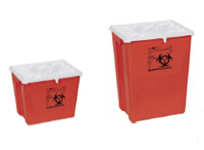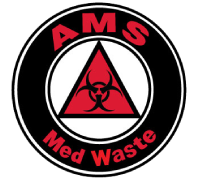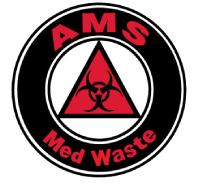
According to the World Health Organization, there are several types of medical waste:
- Infectious waste: waste contaminated with blood and other bodily fluids (from discarded diagnostic samples), cultures and stocks of infectious agents from laboratory work (waste from autopsies and infected animals from laboratories), or waste from patients with infections (swabs, bandages, and disposable medical devices)
- Pathological waste: human tissues, organs or fluids, body parts, and contaminated animal carcasses
- Sharps waste: syringes, needles, disposable scalpels, blades, etc.
- Chemical waste: for example, solvents and reagents used for laboratory preparations, disinfectants, sterilants, and heavy metals contained in medical devices (mercury in broken thermometers) and batteries
- Pharmaceutical waste: expired, unused and contaminated drugs and vaccines
- Cytotoxic waste: waste containing substances with genotoxic properties ( highly hazardous substances, teratogenic, or carcinogenic), such as cytotoxic drugs used in cancer treatment and their metabolites
- Radioactive waste: such as products contaminated by radionuclides including radioactive diagnostic material or radiotherapeutic materials
- Non-hazardous or general waste: waste that does not pose any particular biological, chemical, radioactive, or physical hazard
Since it contains hazardous and infectious components, this waste is hard to utilize or destroy. This is why it is critical to take care of this waste with caution and according to federal and state regulations.
Medical waste can come from all points of care in the healthcare landscape.
Major hospitals have waste disposal equipment to take care of their medical waste; because it is expensive to buy and maintain all the equipment that a hospital needs to get rid of all its waste properly.
So, the smaller organizations typically utilize waste transport services. These services help them transport their waste to a licensed facility that properly destroys their waste.
Another type of transport service is the Postal Service. Small clinics, hospitals, centers, and nursing homes can safely use mail or boxes to transport their waste to facilities that can permanently get rid of the waste. This is the most affordable way for a smaller health center to manage its medical waste.
In all cases, disposal of sharps requires specialty containers, handling, and disposal.
Please remember that disposal of sharps should be handled with the highest care and importance.
Here is a guide to the process of correctly disposing of this high-risk medical waste:
- Seal the container tightly.
- Put the container in the red liner (the box that the container was shipped in).
- There should be a twist and tie attachment on the cover, tie it securely.
- Place the red bag into the shipping/storage box.
- Follow the box’s instructions on how to close it.
- Your sharps container is now ready for shipment.
You can use this medical waste disposal guide to stay on top of medical waste disposal management, and not be affected by HIPAA regulations or lawsuits.
The best practice is to hire licensed companies. AMS Med Waste LLC provides medical waste management services in Northern Illinois and Southern Wisconsin.





